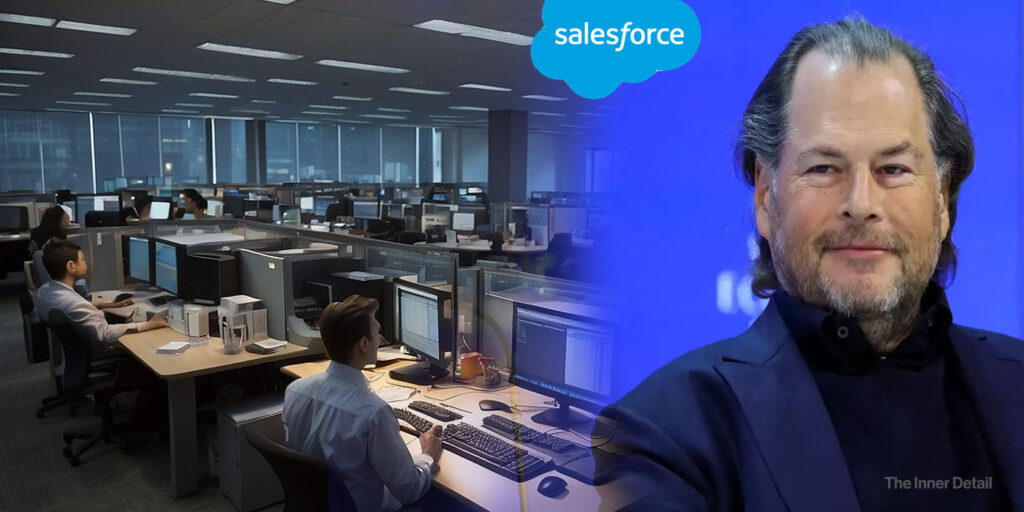In a surprising move, Salesforce, a global leader in cloud computing, has announced a hiring freeze for software engineers. This isn’t due to financial struggles, but rather, a significant leap in productivity driven by their own AI tools.
According to Salesforce CEO Marc Benioff, the company has seen a 30% increase in engineering productivity by using AI tools, particularly their Agentforce platform. This boost means that Salesforce doesn’t require any additional software engineers at this time. As Benioff stated in the “20VC with Harry Stebbings” podcast, “Our engineering productivity has increased by 30 percent, which means we don’t currently require any software engineers. AI has fundamentally changed how we work”. This change reflects a strategic shift towards leveraging technology for operational efficiency.
Though Salesforce won’t be hiring any software engineers next year, the company plans to expand its sales team, hiring between 1,000 and 2,000 new professionals. This move underscores the company’s focus on growing its business, leveraging AI for operational efficiency, and using the workforce for boosting its sales.
AI pushes to shifting roles & upskilling
“AI is not replacing jobs, but shifting roles,” according to Arundhati Bhattacharya, Chairperson and CEO of Salesforce India. AI is intended to complement rather than replace human roles, she said. AI is designed to handle repetitive tasks, allowing employees to focus on more strategic and complex responsibilities. Bhattacharya also notes that AI adoption will shift employment opportunities toward more strategic roles. This approach aims to navigate workforce constraints and enhance efficiency without causing widespread job losses.
Salesforce’s decision highlights the growing impact of AI on business operations and its potential to transform the workforce. This stir by Salesforce questions the scope of software-engineering in future, as the role is on the verge of total replacement by AI models.
Scope of Software engineering in Future
If you had ever used ChatGPT or Gemini for generating code on a given context, you would have known how efficient and precise the AI models are in code-generation. In that case, would a company still prioritize human minds over super-computational AI models? Will AI completely takeover the role of software engineer? Let’s clear it out.
Though tech-leaders say, “AI may only shift jobs, not replace them,” it could be true only to some extent. The productivity caused by deploying AI models will significantly help the companies in achieving targets and it could do so at a comparatively lower cost than paying the engineers. So, a team with 8-10 software engineers before, for example, may now only have 2-4 software engineers with others being either laid off or shifted to other roles. Those who retain are the fittest of the survival. Others may have to upskill to either code better or to learn AI/ML programming.
You may also like this: Top 20 Jobs in Risk due to AI like ChatGPT, Gemini
This also means that AI might not completely takeover software engineers but will surely affect the current count of software engineers. Future work environment will require software engineers to maintain an automated coding system, pushing them to assume a role of ‘manager’ + ‘techie’.
Indeed, software engineers may have to adapt to the constantly changing environment by upskilling or enhancing their skillsets. In that context, here is what software engineers will need to do:
- AI and ML skills: Understanding machine learning, deep learning, and NLP.
- Data science: Including data preprocessing, feature engineering, and statistical analysis.
- Soft skills: Enhancing critical thinking, problem-solving, and collaboration.
- Domain knowledge: Understanding specific industry needs.
- Business understanding: Gaining insight to make better decisions.
- Technical Debt Management: Addressing long-term impacts on productivity.
- Adaptability: Learning new skills and navigating the AI landscape.
Current engineers should become “expert-generalists,” embracing continuous learning. They should see AI as a tool to enhance their work, not a threat. Focus on complex problem-solving, system design, and ethical AI development. The demand for skilled engineers will increase, particularly in AI-related roles.
Read this: 25% of Jobs will change in next 5 years – AI & Data are the key players
New roles will emerge, such as AI maintenance engineers, ethical AI designers, and human-AI collaboration experts. By adapting and learning, software engineers will thrive in this evolving field, as the need for human expertise in software development remains crucial.
(For more such interesting informational, technology and innovation stuffs, keep reading The Inner Detail).
Kindly add ‘The Inner Detail’ to your Google News Feed by following us!

